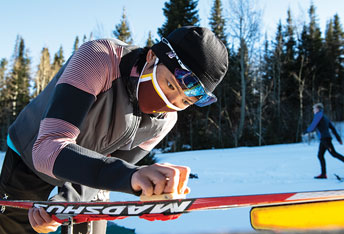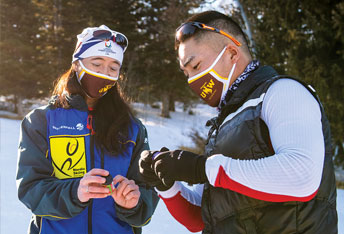
Contact Us
Institutional Communications
Bureau of Mines Building, Room 137
Laramie, WY 82071
Phone: (307) 766-2929
Email: cbaldwin@uwyo.edu
Sharing Sport and Culture
Published May 10, 2023
September 10, 2021

Doris Yan came to UW from China as an undergraduate to study Nordic skiing and returned
this fall as a graduate student in kinesiology.
UW’s partnership with the Shanghai University of Sport brings international opportunities.
By Micaela Myers
Health and sport transcend cultures, and cross-cultural understanding in turn transforms learning, research and even career opportunities. These factors are behind the University of Wyoming Division of Kinesiology and Health’s partnership with the renowned Shanghai University of Sport (SUS).
“It’s an opportunity for us to expand the internationalization and cultural understanding of students, as well as faculty and research scholars at both institutions,” says Division of Kinesiology and Health Director Derek Smith.
The program kicked off in 2019 with SUS students coming to study at UW and will next expand to UW students also going to China to study.
Learning to Ski
One of the factors that drew the attention of the internationally acclaimed SUS was the opportunity for its student-athletes to learn the art of Nordic skiing.
“SUS doesn’t have the resources and facilities to develop winter sports,” says Professor Qin (Arthur) Zhu, who also serves as kinesiology’s international program coordinator.
Conversely, UW students will have the opportunity to go to China to experience the culture and learn sports such as martial arts and table tennis. That exchange would have started in the school year 2020—21 but was delayed due to COVID-19.
The partnership’s Nordic Ski Educational Program, funded by SUS, kicked off in 2019 with UW hosting 10 SUS student-athletes to train with the UW Nordic ski team while they participated in classes and activities designed by UW’s intensive English program and kinesiology. Even though the SUS student-athletes had never skied before, they excelled, attending races and qualifying for the U.S. collegiate national championship.
“It honestly exceeded all of our expectations with respect to SUS athlete outcomes,” says Nordic ski coach Rachel Watson. “They are very dedicated students of sport in all dimensions.”
Not only did they learn to ski, but they also learned about coaching and about technical aspects such as the science of snow.
“We developed an entire curriculum for them around Nordic ski racing—technique, training, conditioning and psychology,” says fellow coach Christi Boggs. “It was a transformative experience for every person involved.”
One of the most transformative aspects was the mentor-mentee relationship, with each SUS student-athlete paired with a UW student-athlete. While the more experienced UW students could help the SUS students with their skiing, the relationships were definitely two-way, with both sides learning from one another.
“I’ve always known that teaching is the best way to learn just about anything, but I’ve only recently come to understand just how powerful that can be,” says Ella DeWolf of Laramie, Wyo., who just completed her master’s degree in botany. “Being a mentor and a teammate to these athletes was so much more than I could have imagined, and I just hope their experience on this team was even half as meaningful as my own.”

Coach Rachel Watson works with Dong Yang Han, a graduate exchange student from Shanghai
University of Sport.
“[SUS student-athlete] Mei helped me learn just how close we are to all the people around the world,” says Katherine Gruner of Casper, Wyo., who graduated spring 2021 with her bachelor’s degree in outdoor recreation and tourism management. “I now know I could have best friends in every country.”
Not only did SUS students become immersed in American culture, but the UW students also became immersed in all things Mandarin—learning customs, cuisine and even some language. Stereotypes and misconceptions fell by the wayside.
“Individuals who grew up in a completely different culture, with completely different political systems and cities—at the end of the day, they were laughing around the table together,” Boggs says.
Because the pandemic prevented a second cohort of SUS students from coming to UW last year, a few of the first cohort were able to stay on longer than expected, including undergraduate Dan “Doris” Yan.
“I learned lots about different aspects of cross-country skiing, including the science and culture,” Yan says. “I also really like Laramie—it is a quiet town with many different outdoor activities. Additionally, people are nice at UW. They really provide a family feeling.”
In fact, she liked it so much, she returned to start her graduate kinesiology studies here this fall.
Yan recommends the program to future students: “It’s good for students to challenge themselves for something greater. Also, through this process you will learn how to ski, practice English, and cultural and scientific knowledge.”
A Growing Partnership
Despite the pandemic, more than 40 SUS students have experienced UW through one of three initial programs: a short immersive summer program, the yearlong Nordic program (open to both undergraduates and graduate students) and a six-month visiting scholar program for graduate students. A new dual master’s degree program is also in the works, which will combine study at both institutions.
Zhu says UW has been identified as one of three strategic SUS partners to carry out international programs, including faculty exchanges, research collaboration and study abroad with financial support from SUS. He is also working on international partnerships with several other universities. These partnerships not only expand understanding and perspectives, but they also make students more competitive for jobs in a global economy. For example, Zhu says strength-conditioning coaches are in high demand in China.
“By understanding the culture, students will be more flexible and successful in the international market,” he says.
Smith says UW’s location and access to outdoor recreation—in addition to standout academic programs—put it in a unique position to cultivate these international partnerships.
“Sport, health and human performance should be disciplines that really transcend geopolitical barriers,” Smith says. “In kinesiology and health, we have the strong value to make sure we’re trying to help our students learn and understand different cultures and approaches to health and sport training. It also sets the stage for international collaboration. By extending and growing these partnerships, it allows us to build stronger interdisciplinary teams to address challenges that affect the globe.”
Contact Us
Institutional Communications
Bureau of Mines Building, Room 137
Laramie, WY 82071
Phone: (307) 766-2929
Email: cbaldwin@uwyo.edu


